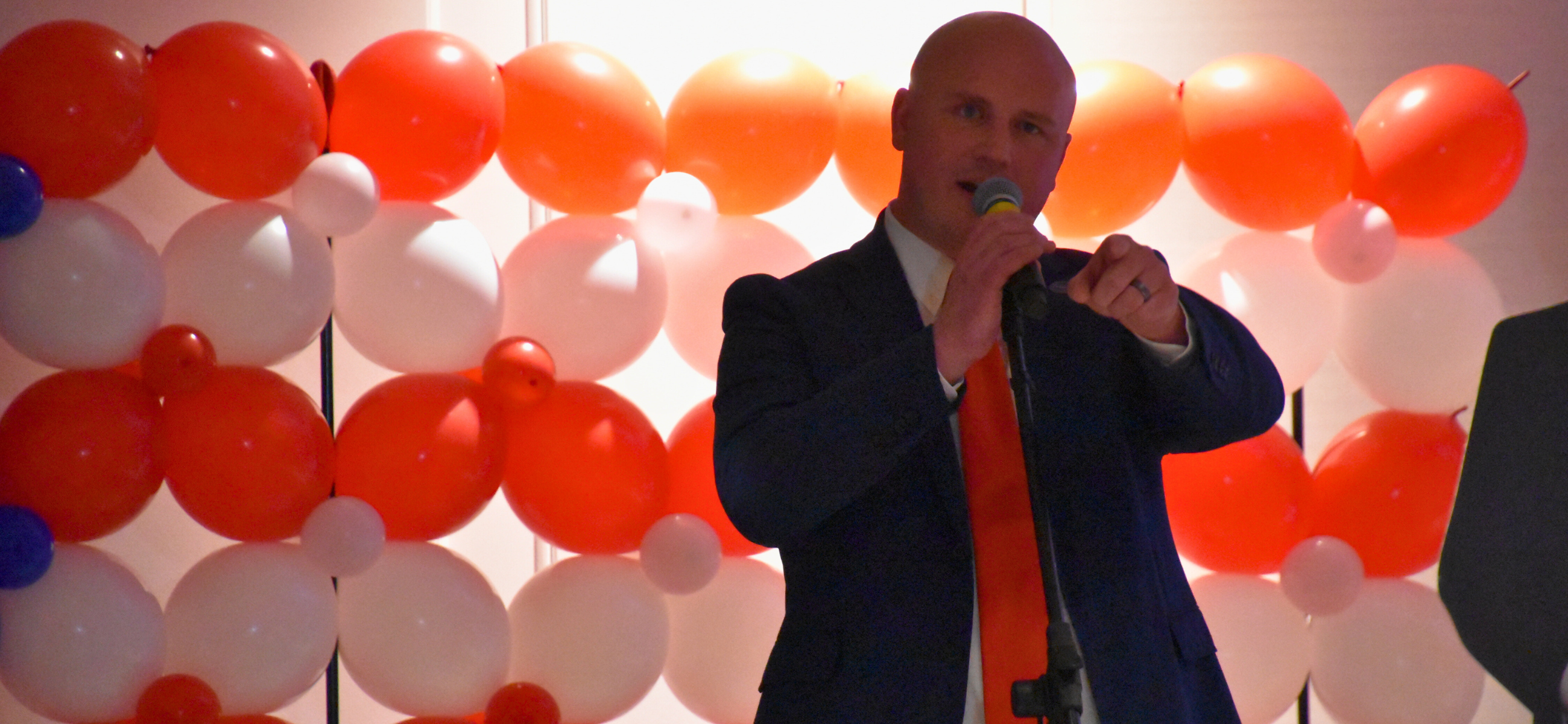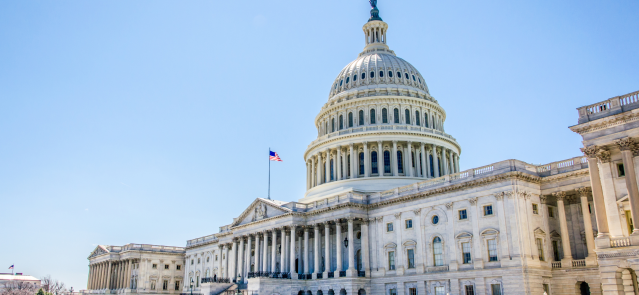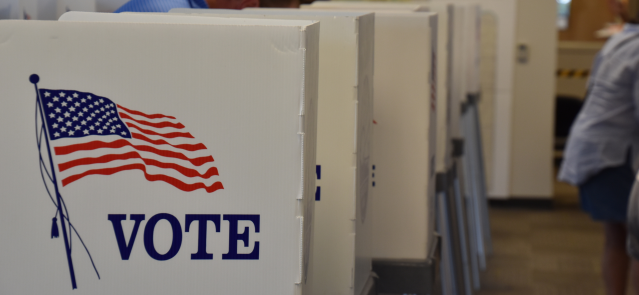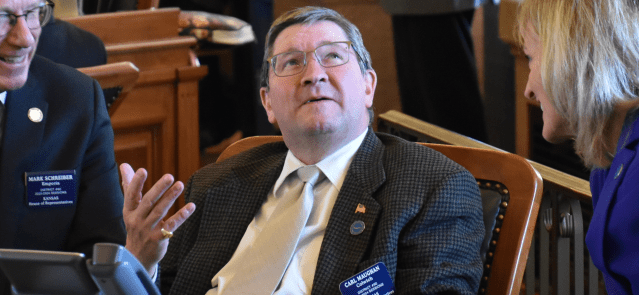Stay ahead of the curve as a political insider with deep policy analysis, daily briefings and policy-shaping tools.
Request a Demo
Rep. Adam Thomas speaks Tuesday, Nov. 5, at the Johnson County Republican Party's election night watch party. (Credit: Brett Stover)
- GOP lawmakers maintain opportunity to override Gov. Kelly’s vetoes
- Republicans had nearly clean sweep of important races
- Some legislators touted the victory as mandate for party
OVERLAND PARK — Kansas Republicans’ supermajorities will remain intact in the House and Senate, based on unofficial election results Tuesday.
All eyes were on Johnson County as Kansas’ most populous county held the key to whether a 14-year dual Republican supermajority would continue in the Legislature.
The county’s 10 Senate races and 27 House races represented some of Democrats’ best opportunities to gain the three Senate seats and two House seats needed to end the two-thirds majority.
However, unofficial results indicate Republicans are in prime position to gain seats in the House and Senate.
A supermajority break would have prevented a straight party-line vote from overturning Gov. Laura Kelly’s vetoes.
“The veto pen runs through Johnson County,” Jeremy Jansen of the Democratic Legislative Campaign Committee told reporters during a Zoom call last week.
Rep. Sean Tarwater, who won reelection Tuesday, was excited for the GOP’s opportunity to override more vetoes over the final two years of Kelly’s term.
“She is the most overridden governor in Kansas history, and you haven’t seen anything yet,” Tarwater, R-Stilwell, said at a Johnson County Republican Party watch party.
Rep. Adam Thomas, R-Olathe, said the governor is “always going to have a seat at the table.” He was elected to the 23rd District Senate seat left vacant by Sen. Rob Olsen, who often crossed party lines to help Democrats sustain Kelly’s vetoes.
“We’re not running for a supermajority to just basically do whatever we want, to just say it’s our way or the highway,” Thomas said, noting the bipartisan support for some tax cut bills Kelly vetoed earlier this year.
“What we’re saying is if bipartisan efforts are made to pass good, sound tax policy — or policy in general — it is certainly nice to have that ability to say, ‘You’re wrong, the people think you’re wrong and we’re going to pass these bills anyway,’” Thomas said.
Victorious Republican candidates touted the effort put in by volunteers throughout the campaign, and some described the resounding victory as a mandate for the party. House Majority Leader Chris Croft, R-Overland Park, was triumphant as he delivered one of the night’s final speeches.
“They [Kansas voters] want us to continue to make history, not become history,” Croft said.
At the Johnson County Democratic Party’s election night event, the mood was more subdued. Rep. Rui Xu, D-Westwood, said he was hopeful for a “bluer result.”
“It’s certainly not the blue wave that people here might have hoped for,” Xu said, “but that doesn’t mean there aren’t races we’re still going to win.”
Xu won his race, as did Rep. Dan Osman, D-Overland Park, who called election night a bittersweet evening.
“I’m happy that I won and that I can go back and serve my constituents, but I really wanted to push things forward for everyone,” he said. “And this is not the way we’re doing it.”
Sen. Ethan Corson, D-Prairie Village, also expressed disappointment over the results, adding that it’s “premature” to discuss Democrats’ strategy in confronting the GOP supermajorities and that the party needs additional time “to sift through the numbers.”
“We had obviously hoped for a better result in Johnson County and didn’t necessarily get that,” he said.
Corson, an incumbent who coasted to victory, said that as a Johnson County native, he was “deeply honored by the support” he received in his district.
“I’ve tried to be open, accessible and accountable,” he said. “And I’ve tried to govern from the center to bring people together and build coalitions.”
Republicans nearly had a clean sweep of the 15 races State Affairs identified as important to determining whether the supermajorities remained:
- Senate District 5: Republican Jeff Klemp was up 61 votes on Sen. Jeff Pittman, D-Leavenworth, with both garnering 50%
- Senate District 10: Sen. Mike Thompson, R-Shawnee, 52%; Democrat Andrew Mall, 48%
- Senate District 11: Sen. Kellie Warren, R-Leawood, 52%; Democrat Karen Thurlow, 48%
- Senate District 22: Republican Brad Starnes, 51%; Sen. Usha Reddi, D-Manhattan, 49%
- Senate District 23: Rep. Adam Thomas, R-Olathe, 53%; Democrat Stacey Knoell, 47%
- Senate District 35: Republican TJ Rose of Olathe, 53%; Democrat Jason Anderson of Overland Park, 47%
- House District 14: Republican Charlotte Esau, 52%; Rep. Dennis Miller, D-Olathe 48%
- House District 15: Republican Lauren Bohi, 51%; Rep. Allison Hougland, D-Olathe, 49%
- House District 28: Rep. Carl Turner, R-Leawood, 51%; Democrat Ace Allen, 49%
- House District 30: Rep. Laura Williams, R-Lenexa, 53%; Democrat Betsey Lasister, 47%
- House District 39: Rep. Angela Stiens, R-Shawnee, 52%; Democrat Vanessa Vaughn West, 48%
- House District 49: Rep. Nikki McDonald, D-Olathe, was up 95 votes on Republican Kurtis Ruf. They both garnered 50% of the vote.
- House District 67: Republican Angel Roeser of Manhattan, 53%; Democrat Kim Zito of Manhattan, 47%
- House District 88: Rep. Sandy Pickert, R-Wichita, 52%; Democrat Veronica Gillette, 48%
- House District 102: Republican Kyler Sweely, 52%; Rep. Jason Probst, D-Hutchinson, 48%
Heading into the election, the National Conference of State Legislatures said supermajorities were at a “historical high” with 28 states having them — Republicans in 19 states and Democrats in nine.
Both Kansas chambers have been under a GOP supermajority since the 2010 election when House Republican membership grew to 92 from 76, a reflection of a nationwide trend — led by the Tea Party movement — that saw Republicans gain power in state legislatures and Congress.
A continued surge in Kansas to push out Democrats and — more important — moderate Republicans led to a 2014 peak for the supermajority, with Kansas electing 97 Republican representatives to join 31 GOP senators.
But the shrinking numbers since then started with the post-reelection unpopularity of Gov. Sam Brownback in the aftermath of his tax-cutting policy that a less conservative Legislature repealed in 2017. This also led to the ascent of Kelly, who frequently warns about potential policies returning Kansas to the Brownback days.
Know the most important news affecting Kansas
Get our free weekly newsletter that covers government, policy and politics that impact your everyday life—in 5 minutes or less.
Schmidt headed to Congress; conservatives win state school board majority
Former Attorney General Derek Schmidt was elected Tuesday to represent the 2nd Congressional District. Also, conservatives won a majority of seats on the Kansas State Board of Education.
General election 2024: Full Kansas Legislature results
Voters across the state cast their ballots Tuesday for all 165 seats in the Kansas Legislature. Some candidates didn’t have opponents, but 75 House races and 32 Senate races required Kansans to select a winner.
Election Day 2024: State Affairs brings you the fair, transparent, nonpartisan coverage you deserve
Election Day is here and State Affairs stands ready to bring you the kind of election coverage you deserve — fair, transparent and rooted in a commitment to nonpartisanship. Across the states, voters are casting their ballots, deciding on leaders and policies that will shape our communities and futures. And as the results come in, …
Maughan pleads no contest to DUI: Gun charge dropped, jail time suspended
Wichita-area Rep. Carl Maughan avoided jail time while also securing the dismissal of a misdemeanor gun charge stemming from a DUI arrest in March. Maughan, R-Colwich, received a suspended three-month sentence Monday for his arrest on suspicion of DUI after a traffic stop yielded an empty bottle of Fireball whisky and “an open cardboard box …



